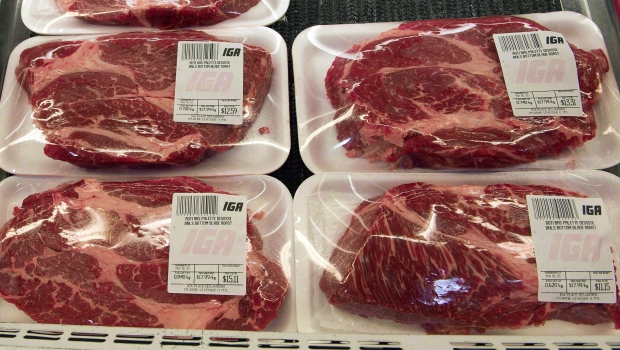As costs rise, majority of Canadians are changing their food-buying habits, survey finds

Four in five Canadians have changed their household menus to adapt to rising food prices, a new national survey has found
According to the Angus Reid Institute, 46 per cent of Canadian consumers are switching to cheaper brands at the grocery store, one-third are cutting back on meat, and one in five are buying less fresh fruit and fewer vegetables.
Sixty-two per cent of survey respondents also reported eating out less and a quarter said they’re drinking less alcohol.
“Canadian inflation surpassed five per cent for the first time since September 1991 while the Consumer Price Index rose 0.9 per cent in January“The Angus Reid Institute polled a randomized sample of 5,002 Canadian adults across the country between Jan. 7 and 12, and 1,622 people in a second online survey between Feb. 11 and 13.
The institute notes that inflation and Canada’s supply chain management system are both contributing to sticker shock at the checkout.
Last month, Canadian inflation surpassed five per cent for the first time since September 1991, according to Statistics Canada. On a monthly basis, the Consumer Price Index rose 0.9 per cent in January, the largest increase since January 2017.
This month, Canadian farmers also received an 8.4-per-cent increase to the price they’re paid for milk, resulting in increases as high as 15 per cent in the cost of a 4-litre jug of milk at the grocery store.
Canada’s Food Price Report for 2022 anticipated steep increases for all food items throughout the year.The projected increase of between five and seven per cent is expected to add up to $1,000 to the annual grocery bill of a Canadian family of four, with the highest cost increases hitting produce, bakery items, restaurant prices and dairy products.
The survey asked Canadians how the federal government should respond to increasing food costs, and while 68 per cent of respondents said they support supply chain management, 27 per cent said those policies should be relaxed in the face of rising grocery bills.
Thirty-two per cent said the system should not exist, however, and 40 per cent said the system should remain consistent despite increasing food costs.
While the increases are nationwide, the survey found a disparity in their regional impact.
In Quebec, two-thirds of survey respondents said it’s easy to feed their family — the highest in any region — while in Atlantic Canada, three in five said it’s difficult to keep their families fed.
In British Columbia, where food prices are expected to go up at a “higher than average rate” according to the Food Price Report, results were split — 48 per cent said it’s easy or very easy to feed their families, while 50 per cent said it’s difficult or very difficult.
Four per cent of survey respondents across the country reported visiting a food bank more often than usual as a result of the increased prices.












